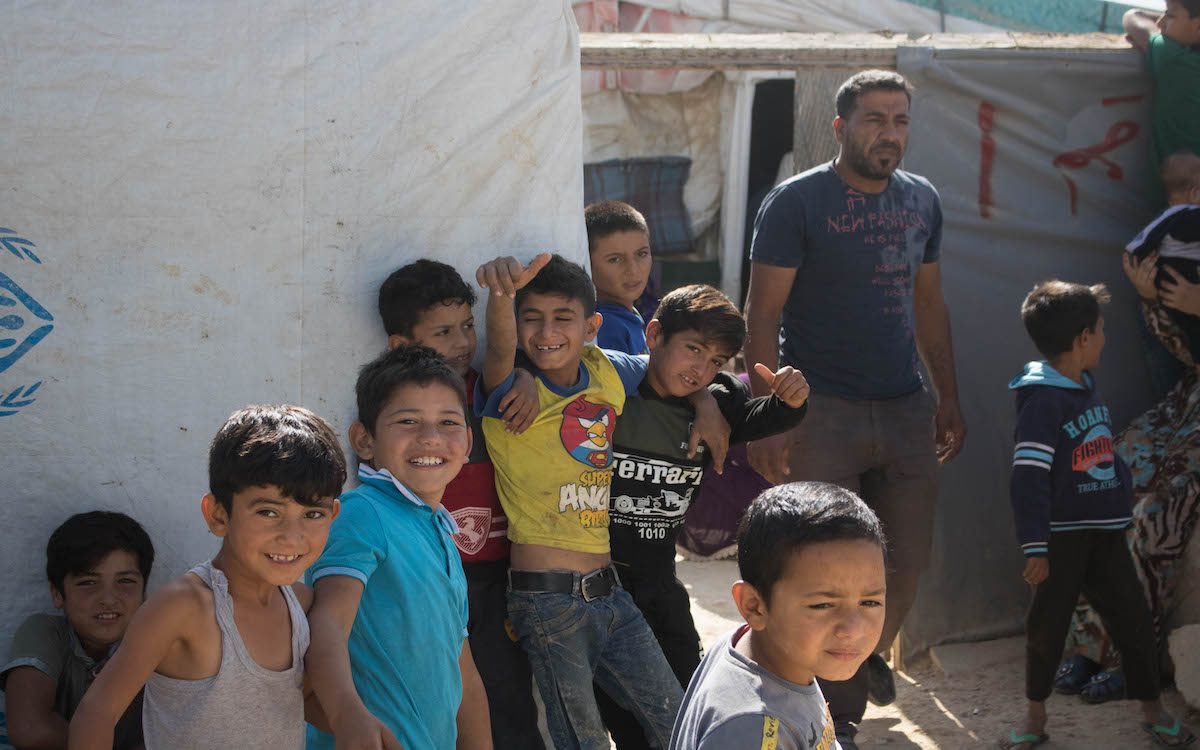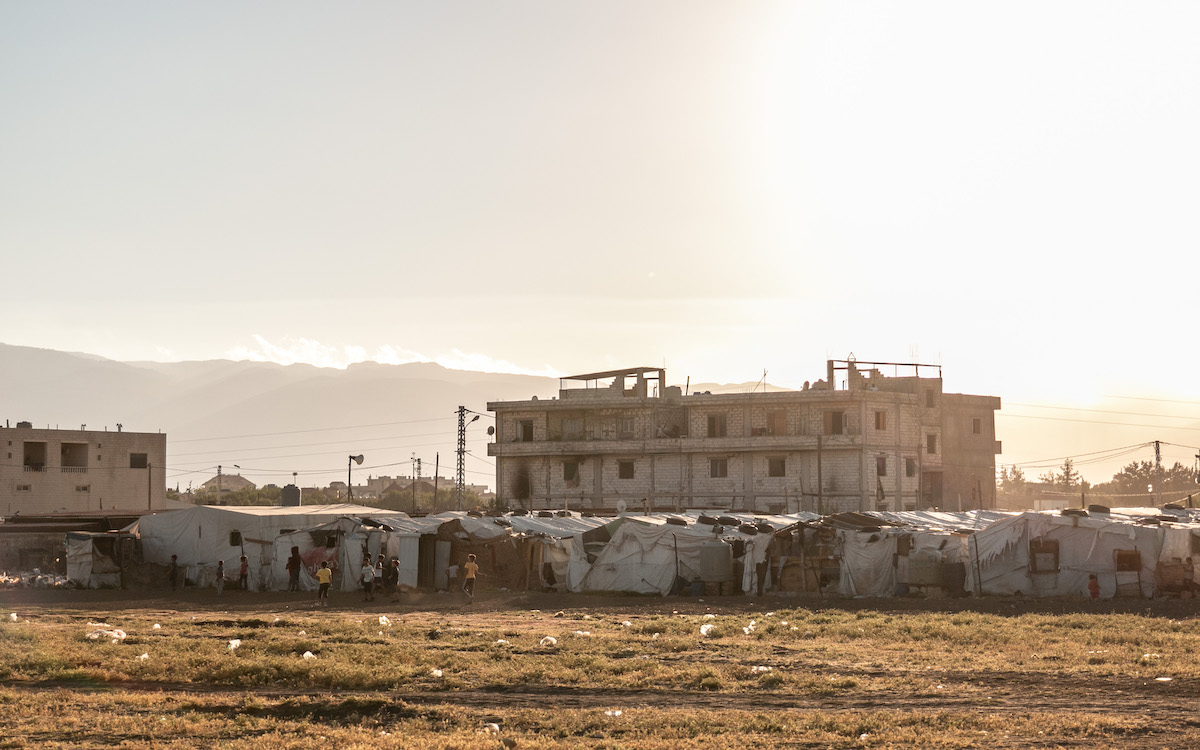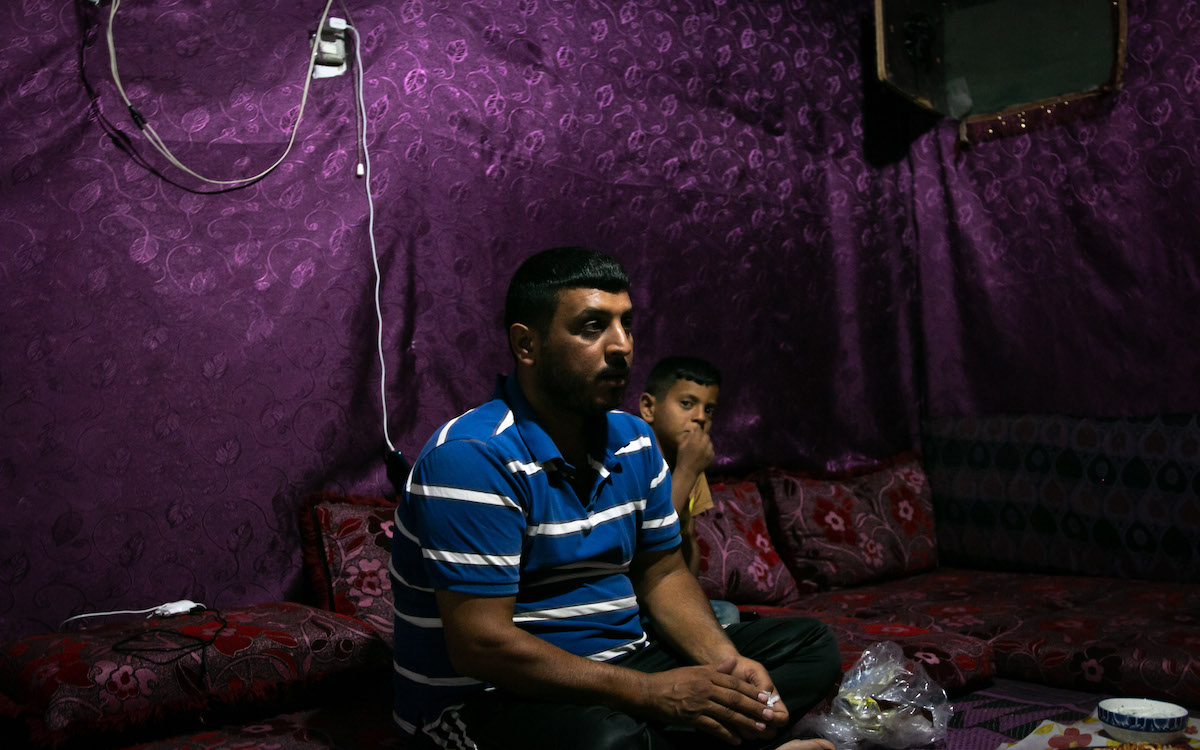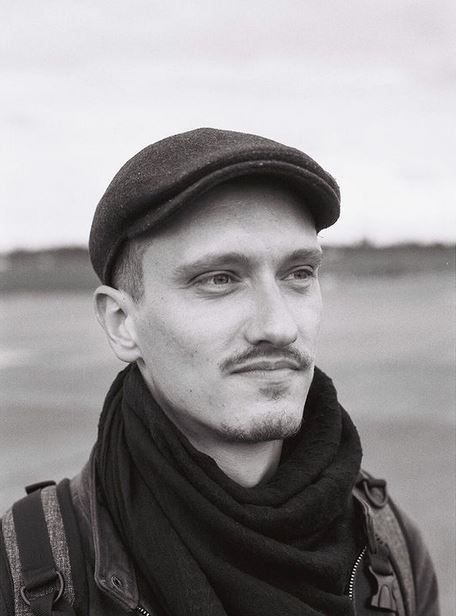
Dozens of buses departed from Beirut, Nabatieh, Tripoli and Arsal on October 26, forming a convoy as they joined up close to the Syrian border. In the middle of the rocky landscape, they halted as armed security personnel inspected their passengers; 750 Syrian refugees who had signed up to be repatriated.
After five hours of inspection, they were authorized to continue their travel back to Bashar al-Assad’s Syria, where they were due to resettle.
They were part of the first wave of the “voluntary returns” campaign orchestrated by the Lebanese state, which had previously touted a plan to repatriate 15,000 Syrians every month. This plan has failed to materialize so far, and only two rounds of voluntary returns were organized last month.
Nonetheless, the campaign raised the suspicions of Lebanon’s human rights organizations. “The government talks about voluntary returns, but the problem is that there is no way to control the truth behind this voluntariness,” Wadih Al Asmar, head of the Lebanese Center for Human Rights (LCHR), told NOW.
A question of free will
“We don’t really think that all these returns are voluntary, but there is no information, no communication on that. And above all, we don’t know what happens to them once they arrive in Syria,” Al Asmar stated, further affirming that the LCHR was investigating and polling Syrian refugee communities.
But other observers believe otherwise. “The return is not compulsory, but voluntary,” Hisham Horani told NOW. As a freelance Syrian journalist working in the Bekaa with the Campji platform, he has gathered information from eyewitnesses in Bar Elias and Zahle. Further sources confirmed this in Tripoli.
If 70 percent of Syrians hope to go back to Syria one day, only 0.8 percent of all respondents planned to leave Lebanon and return to Syria, a 2021 study by the Refugee Protection Watch (RPW) found. On the other hand, 57.7 percent wished to leave Lebanon for a third country.
“But even when the return is voluntary, it doesn’t mean that there is no pressure to leave. Quite the contrary,” Horani added. “The Lebanese state has made life in many camps so difficult recently that many feel forced to leave.”
Building pressure
The Lebanese Army raided several camps in the Bekaa over the last few months, confiscating satellite dishes, TVs and Wifi routers, several refugee families told NOW.
“This happened in the camp next to ours, they want to cut refugees off from the world,” Khawla Khalouf El Hassan, a Syrian refugee and mother of eight, told NOW. Originally from a village in the Aleppo countryside, her family now lives in a refugee camp close to Bar Elias.
“Last week, the army came into a neighboring camp for a raid at 4 am. They detained many people to check their status. We’re afraid of it happening to us and then getting deported,” her husband, Mohammed Zakaria al Jasm, added.
This fear of deportation has intensified since the General Security Office has stopped renewing numerous residency visas for Syrian refugees, sources told NOW.
“They want to push us out of the country, and the best way is to make us illegal,” Horani claimed.
Because of this, refugees face increased restriction of movement due to checkpoints, and many more live fenced off from the world. Numerous camps around Arsal are closed and refugees need a permit to leave for work. For Horani “such reasons prompt the refugees to return because they prefer to die in Syria rather than live in camps in Lebanon.”
The UNHCR told NOW that “thousands of refugees choose to exercise their right to return each year. UNHCR respects the decisions made by refugees.”
Life here is very difficult. We don’t have sufficient food, we earn almost no money even if we work in the fields.
Yet, it explicitly confirmed in March 2021 that it could not ascertain the voluntariness of spontaneous returns of Syrian refugees. “If they are subjected to pressures and restrictions and confined to closed camps, they may choose to return, but this is not an act of free will,” confirmed the UNHCR’s Handbook on Voluntary Repatriation.
Life in hell
Even beyond immediate pressures, life in Lebanon has become so difficult that, for some, returning to Syria seems to be the only way to survive.
As Lebanon enters the fourth year of the worst economic crisis in its history, living conditions for both Lebanese and Syrian residents have become dire.
82 percent of the former and 99 percent of the latter live in poverty, the UN reported.
“Life here is very difficult. We don’t have sufficient food, we earn almost no money even if we work in the fields,” El Hassan told NOW.
As winter approaches, many are afraid of drastic conditions.
“Last year, our tent collapsed under the weight of the snow. It was freezing cold inside, because we can’t afford to heat ourselves,” she added.
Without assistance
Escaping the cold and the hunger might have motivated many among the thousands of returnees, especially since 70.5 percent of all Syrian respondents in Lebanon reported not having received any kind of humanitarian assistance since January 2020, RPW found.
“The United Nations does not help the refugees to restore the tents, although these tents are old since 2013,” Horani told NOW.
Moreover, numerous refugees have recently reported being cut off from UNHCR’s financial aid – 500,000 LL every month per person, up to six heads in one family.
“Due to budget constraints, not all refugee families receive cash assistance, and therefore, UNHCR and partners have to prioritize families determined to be the most economically vulnerable,” the UNHCR stated.
Consequently, all refugees interviewed in the study indicated that they were in need of support to cover basic necessities, with the greatest needs being rent (76.1 percent), food (67.9 percent) and healthcare/medicine (39.8 percent), according to RPW.
“Push factors hinder Syrian refugees in Lebanon from taking true voluntary decisions to return,” the report confirmed.
72 percent of returnee respondents in Syria reported that the difficulties of living in Lebanon were the main reason that pushed them to go back to Syria, the report found.
On the other hand, only 25 percent of the study’s respondents stated that reasons such as work opportunities within Syria, the cessation of hostilities, or the reopening of roads in Syria had in part motivated them to go back.

Not exactly a safe haven
But some challenges await those who, out of despair, decide to return to Syria. First, a thorough “security screening” from the Syrian side.
Lebanese officials said that more than 2,400 refugees had registered for a return last October, but only 1,700 were given the green light by Syrian authorities to come back – out of which only 750 left in the end.
The rules vary depending on visa and residency statuses. Syrians who never received any residency permit, and entered Lebanon “illegally” need to pay a fine and receive a permanent re-entry ban.
Then, they must undergo a “status settlement” (taswiyat al-wadaa) or “security clearance” (muwafaka amniya). Through this process, the Syrian authorities verify whether a person is on a wanted list or is considered a “security threat”.
Those without such clearance are refused entry. Since many Syrian men fled from military service and/or were engaged in anti-regime protests, they risk arrest, torture and disappearance upon arrival back to their home country. Amnesty International and Human Rights Watch have documented numerous cases.
“If I go back, I will very probably be jailed, hanged or executed, since I’m an opponent to the Regime,” Ali Shahine told NOW. A Syrian refugee living in Tripoli, he fears being deported if the government implements its plan of returning 15,000 refugees each month.
“What awaits us is either execution, disappearing or conscription, which is just another form of death,” his colleague Yarob el Qaissy added.
Between detention and bombings
70 percent of returnee respondents in Syria are concerned that either they themselves, friends, or relatives will be forcibly conscripted into the Syrian Arab Army, according to RPW.
Lebanon’s Minister of the Displaced, Issam Charafeddine, asserted that out of the 87,000 Syrians who he said have voluntarily returned from Lebanon to their country to date (UNHCR has recorded a lower number, 70,185), “there were 34 people who were arrested, but because of civil suits against them, not anything political.”
Human rights organizations have contradicted his statement. The Syrian Network for Human Rights (SNHR) documented the arrest of at least 1,916 refugee returnees (including 219 children and 157 women) in the period between 2014 and August 2019, and at least 62 cases of arrests and enforced disappearance of Syrian refugees who returned from Lebanon in 2020.
Adding to this, Syria’s 11-year-old civil war continues to pose a threat for returnees. Although the war does not represent a threat all over the country, suicide attacks are still recurrent.
According to United Nations numbers, in 2020 on average 76 explosive incidents occurred per day, and one in two Syrians are at risk of explosive ordinance. Since then, fighting has intensified in Syria’s north, as HTC captured Idlib and Turkey continued bombarding Syrian bases.
Is the situation actually better in Syria?
One main problem for returnees was the absence of clear information about what they would find upon returning. Two-thirds of Syrian returnees claim they had no reliable information about their areas of origin in Syria, RPW found. Many have faced negative surprises: destroyed houses and worsened living conditions.
Besides the war, detentions, and forced draft, Syria is also plagued by a drastic economic crisis – not much better than Lebanon’s own. Almost 90 percent of the population live below the poverty line, while 60 to 65 percent are estimated to live in extreme poverty.
The Syrian state encourages the return of young men from 18 to 45 years old, either to participate in the fighting or to rebuild the country.
RPW’s study among returnees found that only 29 percent were able to cover their basic household necessities and needs. Because of this, 40 percent of them were thinking about leaving Syria again as soon as they could.
43 percent mentioned that their condition was somewhat better in Syria, mainly due to psychological and personal well-being and being in their “own” country – however, 38 percent affirmed that for them the situation was better in Lebanon, the study found.
Syria’s new workforce
Syria has recently intensified its efforts to attract refugees back to the country.
“The Syrian state encouraged them and gave them confidence and security to return,” Hisham Sorani told NOW.
A tight net of the feared Syrian moukhabarat, or secret police in English, is active in refugee camps, apparently convincing some refugees to return back.
“The Syrian state encourages the return of young men from 18 to 45 years old, either to participate in the fighting or to rebuild the country,” Horani added.
“But they do not want the educated class to return to Syria, so as not to demand freedom – only cheap manpower,” the journalist claimed.
For LCHR’s El Asmar, Assad’s regime is also vying to restore its image in the eyes of the international community and its donors.
“The regime says, ‘look, refugees are coming back, this means that Syria is doing good but that we need more international aid,’” he explained. “But it is contradictory for a country that claims to have returned to normalcy to go begging on the backs of people it has driven into exile for fear of their lives and for fear of reprisals.”

Complicit international donors
El Asmar accuses the international community of being silent or even complicit in this regard. “For several years, international NGOs have raced to operate in Syria, paving the way for this kind of behavior on the part of Lebanon, Turkey, Jordan to send back Syrians without any regard for their protection and security.”
54 percent of returnee respondents in Syria stated that they were not followed up with by anyone after their return, RPW’s study found. Only 3 percent had been followed up on by UNHCR.
The international institution has not set up a formal monitoring system of returnees.
“UNHCR is involved as part of our protection function, among others, reaching out and counseling refugees, when possible, and being present at the departure points, prior to their return,” the international organization said.
“Neither the UNHCR nor the NGOs are able to guarantee the safety of anyone, not even their staff. I find it unacceptable that organizations have agreed to work under the tutelage of Asma al Assad and thus serve to finance the torture machine of the Syrian regime,” El Asmar stated.
In the meantime, the international community has remained mostly silent and has not stepped up its aid. On March 29 and 30, 2021, the European Union and the United Nations organized the fifth Brussels Conference on the Future of Syria and the Region. Donors pledged a total of 5.3 billion euros – 1.6 billion euros less than the previous Syria Conference in 2020, and 3 billion euros less than the 2019 Syria Conference.
As for the two-thirds of Syrian refugees in Lebanon who wish to be resettled in a third country, their hopes are dashed. In March 2021, almost half of them (40.3 percent) had applied for resettlement. Three-quarters of those who applied reported that they were rejected (76.1 percent), thus remaining stuck between Syria and Lebanon.
A populist campaign
For El Asmar, Lebanon’s repatriation campaign is nothing more than a mediatic coup to “garner attention” and “blackmail” international donors.
“There is a double political and populist interest for both parties, Lebanon and Syria, to exploit the refugees’ return at the international level,” he said.
Ever since the start of the Syrian civil war, the Lebanese state has behaved towards the refugee issue to exploit it politically, he added.
“The campaign has been organized just before Michel Aoun’s departure [from the presidency on October 31] so that he can use this by saying, ‘here I am, I started to send back the refugees’, always in the populist logic,” El Asmar stated.
Lebanon began organizing “voluntary return” trips in 2018. They were halted in 2020 due to the coronavirus pandemic. By then, about 21,000 refugees had returned to Syria in this way, according to Lebanese authorities. At least 76,500 Syrian refugees have voluntarily returned from Lebanon since 2016, some on state-organized trips, others on their own, according to UNHCR.
“The return of Syrians to their land is a national obligation for us,” Abbas Ibrahim, Lebanon’s chief of General Security, said at a press conference on October 25, adding that Lebanon will not “submit to pressure” by international organizations to continue hosting Syrians displaced by war.
It’s like a wild west in the movies. Those with weapons have the power, there is no justice other than force.
Three months earlier, Lebanon had announced a plan to return 15,000 refugees a month,
“We are serious about implementing this plan and we hope to do so within months,” Issam Charafeddine, Lebanon’s caretaker Minister of the Displaced, told the Associated Press. “This is a humane, honorable, patriotic and economic plan that is necessary for Lebanon.”
Since then, Syrian refugees have lived in heightened fear. “Lebanese politicians use us to pursue political goals,” Shahine stated. “I don’t feel safe here at all, I’m always looking behind me”.
Lebanon’s “wild west”
This campaign is part of a wider trend of racism and discrimination Syrians face in Lebanon. Shahine himself was sent to jail twice because he has no residency since the General Security refused to renew it.
“There, I felt like a cockroach, I wished I was never born. They beat me, slapped my face tens of times, cuffed me and threw me into a disgusting cell with an open toilet,” he recalled.
Syrian residents in Lebanon face a “staggering level” of discrimination and racism, according to El Asmar. Not only are they banned from working in all fields besides construction and agriculture, but they are also banned from organizing politically.
Last year, numerous reports of arbitrary arrests, torture and kidnappings of Syrians shocked the public. It is not only the Lebanese state and its security apparatus that represent a threat to Syrian nationals, but also armed militias linked to the Syrian regime.
“Activists and deserters were deported by Hezbollah to Syria and disappeared. Other people were simply kidnapped in zones under Hezbollah, Amal or PSNS control and handed over to the regime,” Ali Shahine told NOW.
This was confirmed by Horani.
“I am wanted by the Syrian state. 6 months ago, people threatened to kill me. I opened the door of the house and found a piece of paper written on it: ‘we are here,’” he said.
The economic crisis has further heightened racism towards Syrian refugees, as they are blamed as “scapegoats”, El Asmar stated. 90.5 percent of Syrian respondents in Lebanon reported feeling increased tension within their communities, RPW’s study highlighted.
This is felt from the North to the South. In Minnieh, one informal settlement was burned to the ground after a dispute between one Syrian and one Lebanese neighbor two years ago. Similar attacks were carried out in the Bekaa and Bcharre in the last few years.
In one of Bar Elias’ refugee camps, Khawla Khalouf El Hassan and Mohammed Zakaria Al Jasm felt the heat. “Life is dangerous here, there are many tensions and fights. If one Syrian child gets into a fight with a Lebanese child, the whole camp will burn,” they told NOW.
“It’s like a wild west in the movies. Those with weapons have the power, there is no justice other than force”.
As they are obstructed from settling in a third country, Syrian refugees remain stuck between two hells.
Philippe Pernot is a journalist and photographer with NOW Lebanon. He studied political science in France and Germany, and he focuses his work on social movements such as feminism, ecology and anarchism, as well as on minority rights and discrimination. Follow him on Instagram.








